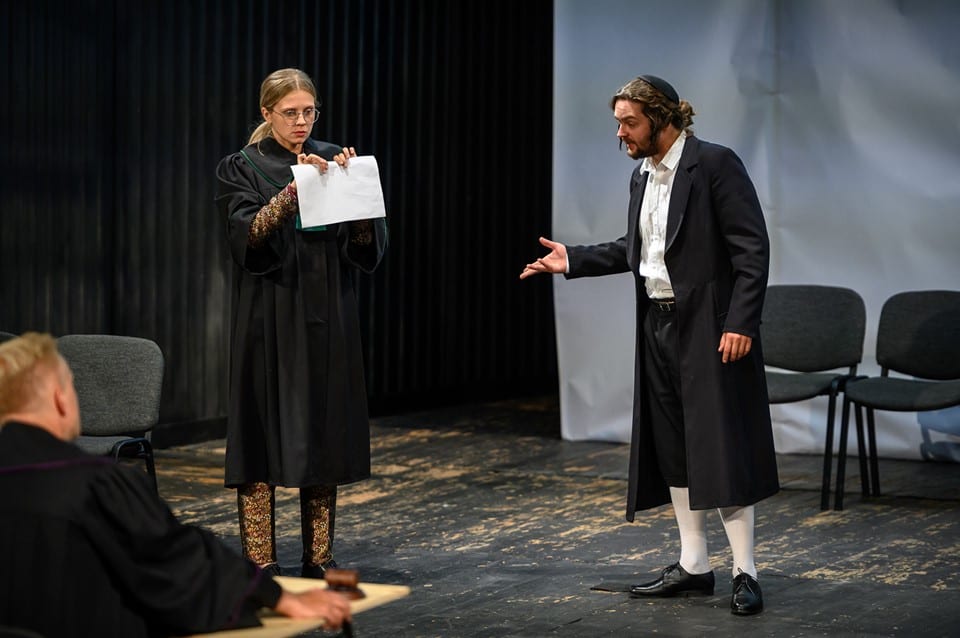This play makes uncomfortable viewing for many Jews and for many non-Jewish people concerned about the resurgence of anti-Semitism among populists throughout the world. The stereotype of the rich Jew who lends money and then demands the Christian’s ‘pound of flesh’ is the rough and spiky ‘steel frame’ in which the plot is embedded. Directors have given many different interpretations of this controversial play. Some show Shylock in a favourable light or at least project the Christians as being as bad as or worse than the Jew. The interpretations vary, and it is intriguing to see which angle a director takes and against which local culture.
This Polish production, directed Szymon Kaczmarek, attempts to explore, through the play both women’s rights and anti-Semitism.
There are only two female characters in this production – Jessica, well performed by Anna Kończal, and Portia, interestingly explored and portrayed by Monika Janik. The two women mirror very different aspects of their gender’s position in society. Jessica appears as a young woman, keen to run away from home and be like the others. She uses her mobile to call her lover, Lorenzo, after robbing her father’s saving. Lorenzo delights in the loot he receives from her but takes no time to unmask his real face as an abusive husband. By the end of the play, Jessica realises that joining the others and betraying her past, brings her no joy. She is terribly isolated and alienated in the new society she so aspired to be part of.

Janik’s Portia is seen on a screen for most of the first part of the play. Her face is dolled up – fake eyelashes, bright red lipstick and heavy makeup around the eyes. She sucks a large lolly and appears as a rather pathetic woman who is bored out of her wits. Her communication throughout the first part is through a video screen. It is only when Bassanio gets the correct answer to her father’s riddle that she comes out from behind the scene, pulls her eyelashes and cleans her face from all traces of make-up, takes her fancy clothes off to present her natural self. At Shylock’s trial, she is calm and moderate and in line with the Bard’s play. Here, her hair is held in a ponytail and no attempts are made to disguise her face apart from a pair of glasses. She is a woman in men’s court and she triumphs as an advocate.

The anti-Semitism issue is explored through the male characters. Krzysztof Kluzik’s Antonio is rather mild and gentle while Wojciech Marcinkowski’s Bassanio is vociferous and abusive. It is Bassanio who exposes the crude, dishonest and cunning Christian. Bassanio has a large cross pendant on his chest. In this production, all three suitors are one – Bassanio. He employs deception on Portia by changing his appearance with wigs and face-paints, recording his reply to the riddle, via a video. This is done with humour, glossing over his unscrupulous process to gain the ultimate objective, the hand and fortune of this heiress.
The trial scene is one of dramatic tension. Shylock enters, dressed as a Polish Chassidic Jew, wearing a large shtreimel (the Hassidic hat that is customarily worn by ultra-religious Jews). I guess this is the stereotypical Jew, Polish audiences can relate to, the pre-World War II image. Throughout the trial, he seems bewildered and uneasy. This Shylock attempts to fit into the society he lives in, but he is ultimately unable or not allowed to shake off his roots. Bassanio, on the other hand, constantly interrupts proceedings through verbal abuse directed at Shylock. He makes a few physical attempts to attack Shylock but is restrained by the Court’s attendees. Portia delivers in a restrained manner the arguments that demolish Shylock’s case and future life.
The final scene made very uneasy viewing for the writer of this review. Lorenzo and Bassanio accompany Shylock to the front of the stage; the two characters that have obtained their wealth by stealth, baptise the Jew. The director clearly wanted to point out the hypocrisy of the ‘Christians’, but a few members of the audience started clapping and isolated cheers of joy were muttered. My blood ran cold. Even a cultured audience cannot shake off the deep-rooted poison of anti-Semitism. The Director admitted that the response of the audience to the enforced baptism of Shylock at the performance in Słupsk was even more resounding. This is a brave take on a play where Catholicism and anti-Semitism are still slumbering together in some corners.
The overall acting was reasonable but in parts lacklustre.
This production won the prestigious Yorik Award.
Hebrew translation הסוחר מונציה
מחזה זה גורם לצפייה לא נוחה עבור יהודים רבים ועבור אנשים רבים שאינם יהודים המודאגים מהתחדשות האנטישמיות בקרב פופוליסטים ברחבי העולם. הסטריאוטיפ של היהודי העשיר שמלווה כסף ואז דורש את 'קילו הבשר' של הנוצרי הוא 'מסגרת הפלדה' המחוספסת והמחודדת שבה העלילה מוטבעת. במאים נתנו פרשנויות רבות ומגוונות למחזה שנוי במחלוקת זו. יש המראים את שילוק באור חיובי או לפחות מקרינים את הנוצרים כגרועים או גרועים מהיהודי. הפרשנויות משתנות, ומסקרן לראות באיזו זווית לוקח הבמאי ונגד איזו תרבות מקומית.
הפקה זו של תיאטרון פולני, ביום על ידי שמעון קצ'מרק, מנסה לחקור, באמצעות המחזה, את נושא זכויות האישה ואנטישמיות בפולין.
בהפקה זו יש רק שתי דמויות נשים - ג'סיקה, שבוצעה היטב על ידי אנה קונצ'ל, ופורטיה, משחק מעניין וטוב של מוניקה יאניק. שתי הנשים משקפות היבטים שונים מאוד של מעמד האישה בחברה. ג'סיקה מופיעה כצעירה, להוטה לברוח מהבית ולהיות כמו האחרים. היא משתמשת בנייד שלה כדי להתקשר למאהבה, לורנצו, לאחר ששדדה את כל חסכונותיו של
אביה, שיילוק. לורנצו מתענג על השלל שהוא מקבל ממנה, אך לא לוקח זמן רב לחשוף את פניו האמיתיות, כבעל מתעלל (מסתבר שזו תופעה שכיחה בפולין). בסוף המחזה, ג'סיקה
מבינה שהצטרפות למחנה-האחר, ובגידה במקור מחצבתה, לא מביאה לה אושר וחופש אליהם כה שאפה. היא מבודדת יותר מתמיד, ומנוכרת בחברה החדשה שכה חלמה להיות חלק
ממנה.
 הדיוקן של פורשיה (Portia) נראית על גבי המסך ברוב החלק הראשון של ההצגה. פניה מאופרות - ריסים מלאכותיים, אודם אדום בוהק ואיפור כבד סביב העיניים. היא מוצצת סוכריה גדולה על מקל,ומשתקפת כאישה די פאתטית ומשועממת.היא מתקשרת לאורך כל החלק הראשון של ההצגה, באמצעות מסך וידיאו. רק כאשר בסאניו נותן את התשובה הנכונה לחידת
אביה, היא יוצאת מאחורי הקלעים, מושכת את ריסיה המלאכותיים ומנקה את פניה מכל עקבות האיפור, מורידה את בגדיה המפוארים כדי להציג את האני-הטבעי שלה. במשפטו של
שיילוק היא רגועה ומתונה. כאן, שיערה אסוף בקוקו ולא נעשים ניסיונות להסוות את פניה מלבד זוג משקפיים. היא העורכת דין בבית המשפט בו כולם גברים, והיא מנצחת כפרקליט.
הדיוקן של פורשיה (Portia) נראית על גבי המסך ברוב החלק הראשון של ההצגה. פניה מאופרות - ריסים מלאכותיים, אודם אדום בוהק ואיפור כבד סביב העיניים. היא מוצצת סוכריה גדולה על מקל,ומשתקפת כאישה די פאתטית ומשועממת.היא מתקשרת לאורך כל החלק הראשון של ההצגה, באמצעות מסך וידיאו. רק כאשר בסאניו נותן את התשובה הנכונה לחידת
אביה, היא יוצאת מאחורי הקלעים, מושכת את ריסיה המלאכותיים ומנקה את פניה מכל עקבות האיפור, מורידה את בגדיה המפוארים כדי להציג את האני-הטבעי שלה. במשפטו של
שיילוק היא רגועה ומתונה. כאן, שיערה אסוף בקוקו ולא נעשים ניסיונות להסוות את פניה מלבד זוג משקפיים. היא העורכת דין בבית המשפט בו כולם גברים, והיא מנצחת כפרקליט.
 נושא האנטישמיות נחקר דרך הדמויות הגבריות. אנטוניו של Krzysztof Kluzik הוא עדין ונינוח, ואילו באסניות אותו מגלם וויצ'י מרקינקובסקי, הוא קולני ואגרסיבי. בסאניו הוא זה
שחושף את הנוצרי הגס, הלא ישר והערמומי. לבסניו תליון צלב גדול על חזהו. בהפקה זו, כל שלושת המחזרים הם אחד - בסניו. הוא מוליך שולל את פורטיה בכך שהוא שינה את
מראהו בעזרת פאות וצבעי פנים, תוך שהוא מקליט את תשובתו לחידה. (דומה לאדם עם זהויות שונות המרמה בכדי להשיג ממון של אחרים). כל זה נעשה בהומור, אף כי אינו מסתיר שמטרתו להשיג את ידה ואת הונה של ג'סיקה.
נושא האנטישמיות נחקר דרך הדמויות הגבריות. אנטוניו של Krzysztof Kluzik הוא עדין ונינוח, ואילו באסניות אותו מגלם וויצ'י מרקינקובסקי, הוא קולני ואגרסיבי. בסאניו הוא זה
שחושף את הנוצרי הגס, הלא ישר והערמומי. לבסניו תליון צלב גדול על חזהו. בהפקה זו, כל שלושת המחזרים הם אחד - בסניו. הוא מוליך שולל את פורטיה בכך שהוא שינה את
מראהו בעזרת פאות וצבעי פנים, תוך שהוא מקליט את תשובתו לחידה. (דומה לאדם עם זהויות שונות המרמה בכדי להשיג ממון של אחרים). כל זה נעשה בהומור, אף כי אינו מסתיר שמטרתו להשיג את ידה ואת הונה של ג'סיקה.
בסצנת המשפט קיים מתח דרמטי. שיילוק נכנס, לבוש כיהודי חסידי פולני, לבוש בשטריימל גדול (הכובע החסידי שלובשים יהודים חרדים בדרך כלל). אני מניחה שזה היהודי
הסטריאוטיפי, שהפולנים מכירים, הדימוי של היהודי מלפני מלחמת העולם השנייה. לאורך המשפט הוא נראה מבולבל ולא נינוח. שיילוק זה, מנסה להשתלב בחברה בה הוא חי, אך
בסופו של דבר הוא אינו מסוגל או לא רשאי להתנער משורשיו. בסאניו, לעומת זאת, מתפרץ בגסות בזמן הדיון המשפטי, ואף מנסה לא אחת להתקיף פיסית את שיילוק, ורק הודות לאנשי ביטחון בבית משפט, הוא לא מצליח. פורשיה (Portia) מגישה באופן מאופק את הטיעונים ההורסים את טיעוניו ועתידו של שיילוק.
סצנת הסיום עוררה צפייה מאוד לא נוחה עבור כותבת ביקורת זו. לורנצו ובסניו מלווים את שילוק לקדמת הבמה; שתי הדמויות שהשיגו את עושרן בערמה, מטבילות את היהודי. ברור היה לי ולרבים אחרים המכירים מחזה זה, שהבמאי רצה להצביע על צביעותם של 'הנוצרים', אך כמה מבני הקהל החלו למחוא כפיים והריעו ברגע שכפו על שיילוק להתנצר. לרגע דמי קפא בעורקיי. המחשבה שחלק מקהל תרבותי זה אינו יכול להתנער מהרעל העמוק של האנטישמיות, היה קשה לעיכול. מאוחר יותר, בשיחה עם הבמאי, הוא הודה שתגובת הקהל
לטבילתו הכפויה של שיילוק זוכה לקריאות שמחה מאחוז גדול יותר של הקהל (בישובים קטנים ורחוקים יותר). לדעתי הבמאי נתן פרשנות אמיצה למחזה בארץ בה הקתוליות והאנטישמיות עדיין מתחבקות יחד בפינות לא כל כך סמויות.
המשחק הכללי היה סביר.
הפקה זו זכתה בפרס יוריק היוקרתי.

